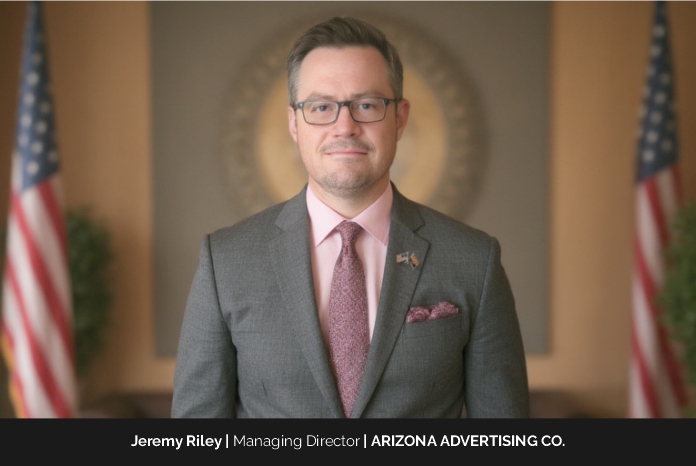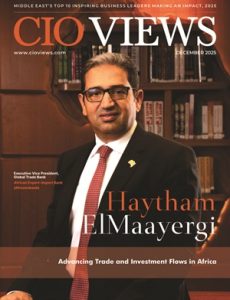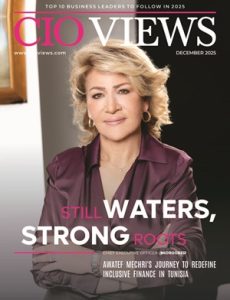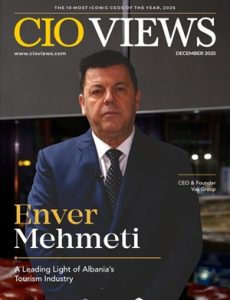If you are fervent about the glamor and zest of the advertising world and strive to shine bright, you must meet Jeremy Riley, Founder and Managing Director, Arizona Advertising Co. His leadership style has a modern blend of people-centric empowerment, creative autonomy, intentional values, and adaptive tenacity. His ethos is rooted in personal experience. He emphasizes empowering talent and creating a culture where people are trusted, rather than micromanaged. It echoes what Peter Drucker once highlighted: the purpose of business is to “produce happiness, not to pile up money.”
He leads by setting direction (not by hand-holding). He creates guardrails and trusts team members with real ownership. Riley emphasizes that creativity is the foundation of great advertising, even to the point of firing the largest client when it becomes misaligned with the agency’s values.
People who reach the top and create a niche for themselves have a reason, emotion, or a cause that keeps them inspired. Passion and necessity kept Riley motivated to pursue a leadership role in the advertising industry. The man has no air despite holding his current coveted designation, and without any qualms, he candidly recalls and shares, “I was fired from my last position before founding Arizona Advertising Co.” He was a VP of Marketing at a digital ad agency. During this stint, he firmly believed that the key to success lay in empowering team members.
“I really believed (and still do) that if you take care of the people working for you (and support them well), that they will, in turn, take care of the business.”
Such observations led him to realize the need for an agency that prioritizes its employees, holds creativity at its core in the digital marketing space, and makes client retention non-negotiable. With these ideologies, he floated AZ AD Co.
As Riley engages with us in this immersive conversation, he gives a few priceless messages to the readers. He reminds everyone to build businesses to uplift people, not just profits. Lead with conviction, care for your people, and let ethical creativity define your legacy.
Early Career Laying a Solid Base
Often, the base sets the tone for the professional journey ahead. Riley feels fortunate to have worked at a large ad agency in Portland, Oregon. It exposed him to working with some of the world’s greatest brands, including Nike, Microsoft, Kroger, and many others. However, he is particularly grateful for the opportunity to collaborate with Intel, which helped him understand breadth and creativity within the advertising world. Back then, he worked as an account planner/strategist, and his team handled strategic initiatives for some of Intel’s most successful programs.
He recalls one of those initiatives, a co-marketing campaign between Paramount Pictures (the reboot of “Star Trek” from 2007 to 2009) and Intel. They got to plan a 100% custom activation at San Diego Comic Con and controlled the entire booth. The team adopted one of Riley’s ideas, “Build Your Own Crew.” It was a huge success. They had thousands of people in their booth at any given time. The activation went viral, and during the four-day event, posts on Twitter were never-ending in their search for strangers to complete their crew and win coveted prizes. He felt incredible designing such a massive masterpiece. Collaborating with Star Trek and Intel on a novel approach to engage all attendees was a truly remarkable feat.
“This was the single event (for me) that took advertising from ‘just another job’ and turned it into a mechanism in which worlds could be created. It was that hook that made it something I wanted to do long term.”
Unexpected Lessons while Leading Arizona Advertising Co
Riley’s path to establishing and leading Arizona Advertising Co. wasn’t free from hard-hitting lessons. Among many, he recalls, the ‘Power of Saying No’ was an impactful takeaway early on. He used to think that growth equated to saying “Yes!” to every opportunity and every prospect that came across our desk. That success meant holding on to a client for eternity and doing whatever the latter wanted.
When ignorance was replaced by cognizance, Riley fired a client for the first time. In their second year, they signed a Fortune 500 tech company. His team, along with the client’s staff and leaders, collaborated and worked incredibly well together. However, setbacks began when the client hired a new VP of Marketing who clearly lacked experience. Delays became routine, and it was evident this individual was learning on the job. Both the internal client team and Riley’s team grew unhappy with the new leadership. The VP’s misguided direction pushed Riley’s company down a path they knew wouldn’t lead to success. After several months of trying to support both the person and the client (only to be ignored), Riley’s team made the difficult decision to part ways with the largest client in the company’s history.
But if there’s one thing you can say about fate, it doesn’t lack a comedic sense of irony. At the end of 2024, the same company returned to Arizona Advertising Co. – sans a certain problematic pariah – and is once again an active client.
Keeping Company Mission and Employee Creativity Intact
At Arizona Advertising Co., alignment with the company’s mission begins with who joins the team. The agency prioritizes getting and retaining the best talent. From day one, it invests heavily in its people by offering a premium salary, comprehensive benefits, unlimited PTO, and various facilities. Riley reminds us that what really matters is hiring individuals who are self-reliant, have the right mindset, and are supremely talented. He counts this approach as one of the most grateful lessons he learned as a leader. Finding the right team member needs discernment, time, and intentional effort. “With the foundation of the right people in place, we don’t have to micromanage each other. We can set direction, provide guardrails, and then trust the team to take ownership of the work in ways that push the agency forward.”
EQ in Leadership Style
To lead, the focus has long shifted from intelligence quotient to emotional intelligence, also known as EQ. The latter has placed a sizable number of talented and intelligent people into a high-functioning team.
Riley says that one of the biggest EQ challenges in agency culture is the fear of making mistakes, losing clients, and even losing one’s employment. One is interconnected to the other. He has devised a formula to combat it. “I try to focus on reframing failure. I remind the team that failure is the best teacher.”
He doesn’t feel ashamed to accept his lack of knowledge about something. “I normalize saying, ‘I don’t know’ or ‘I am not sure.’ I follow that with a clear next step, like, let me check with so-and-so and follow up by the end of day.”
It might appear as a simple shift, but it reduces fear and builds trust. Over time, it creates a culture where people feel safe to take risks, own their learning, and contribute more openly.
Most Meaningful Professional Accomplishment
Despite the success, humbleness hasn’t left this man. It is no small feat to secure the spot among, the 10 Most Influential Business Icons to Watch in 2025. Nevertheless, Riley has a unique perspective on achievements. He focuses more on personal accomplishments and it mirrors in his organization. “Family comes first. Our company is all about family, and those accomplishments mean more than any career accomplishments will.”
Nevertheless, he doesn’t disapprove of notable professional milestones. He is extremely proud that his company is still here and thriving in the post-COVID-19 pandemic era. In contrast, many agencies went out of business. He considers such a feat by his ad agency a massive accomplishment and a testament to its approach, which is why it is still here and growing.
A Typical Day as the Founder and Managing Director
Every successful leader devises a method that helps with time management and keeps chaos under control. How does Riley handle his typical day at work? He says he isn’t a pro at prioritization. “Everything is a top-priority to me (it’s a curse),” he states, bursting into laughter.
In July 2025, he continues to try the Timebox approach. Where tasks during the day all have a time frame. He also works on a few clients; thus, the company administrative tasks and client deliverables are timeboxed daily. How have the results been so far? “I don’t feel like I’m successfully using it, as I don’t seem to follow the schedule very well. But I’ll let you know how it goes in a year or so from now,” Riley replies.
His typical wake-up time is between 7:00 and 8:00 am. After breakfast, he drinks water and surfs the internet for shorts, research, and keeping up with trends and popular culture. At 8.00 am, he begins his typical workday by checking emails for about an hour. These emails generally ruin his daily timeboxing. The next hour is often allocated for company-related tasks, such as budgeting and strategy development. The remainder of the day involves balancing time-bound tasks with emergencies. This year, they decided to specialize in AI marketing and become their clients’ preferred agency of record. So, after hours, he ponders what said goal implies and what adjustments the company must make to be successful with this slight pivot.
In an industry that thrives on constant reinvention, Riley goes the extra mile to stay innovative. He credits the original idea of bringing more branding, storytelling, and creativity to digital marketing as revolutionary. Now, leveraging AI in ways they never thought of before keeps him excited about the industry. “Thankfully, I was an early adopter of the influx of AI tools. That helped me personally and professionally in my company.” The visionary leader also predicts that another major AI wave is upon us, and if the AI change isn’t compelling enough for adoption, you (or your organization) may not survive.
Contributing to Ethical Storytelling and Cultural Relevance
“I believe the industry will be better when it balances privacy with creativity, and we’re building toward that future,” says this creative genius. From the yesteryears, Riley cites some of the most iconic ad campaigns, such as Nike’s ‘Just Do It’, Volkswagen’s ‘Think Small’, ‘Got Milk?’, etc. According to him, such ads succeeded because they tapped into universal human truths, rather than relying on hyper-targeted tracking.
As an industry leader, he and AZ AD Co. support the shift toward stronger privacy protections. Why? Such ideology pushes one back to what made advertising great in the first place. It squares back to creativity, storytelling, and cultural relevance. For AZ AD CO., the opportunity with AI isn’t about squeezing more data out of people. It’s about using AI to amplify human creativity, while keeping ethics and respect for the consumer front and center.
“If years from now, people can look at the AI-empowered campaigns we created and talk about them with the same respect universities give to Wieden+Kennedy, TBWA\Chiat\Day, or DDB, then I’ll know we’ve contributed something lasting to the evolution of advertising,” Riley states.
Future of Advertising and Staying Relevant
He believes artificial intelligence, or AI, represents the next great age for humanity, similar to the Industrial and Digital Ages. While AI might replace specific functions or job roles, Riley believes that its primary function in most industries will be that of an enhancer and collaborator (not a replacer).
Riley gives us the example of writers. For these professionals, AI helps break creative blocks and speeds up progress. He cites real-life instances of how some projects have stalled for years, as in the case of George R. R. Martin and the Game of Thrones books. AI can help break through writer’s block.
Riley then focuses on advertising. In this sector, AI serves as a knowledgeable assistant or team member. By utilizing AI, professionals gain new insights, and AI also supports effective campaign execution. “We can train AI on everything we know about a client. If our humans are running dry with content ideas, we can ping AI, it will already know what we have produced previously, our requirements, and flying formation when it helps our team in coming up with ideas,” he informs.
According to him, AI cannot supplant the team, but it can boost their efforts. His company focuses daily on maximizing AI’s effectiveness, valuing collaboration and input from all staff and keeps adapting to the rapidly changing role of AI in marketing.
Looking ahead, he says he would love to see major changes in pharmaceutical advertising and advertising to children. “I do believe everyone has the right to advertise, but I would love to see more rules and regulations to protect those who need protection (e.g. children).”
Advice for Advertising Industry Aspirants
The advertising world has always been a dynamic one. With its witty captions, impactful messaging and vivid visuals, it can leave a lasting impression. However, to continue this saga, the industry requires a steady stream of creative genius. Being a veteran in this field, Riley has a few realistic tips. “Don’t get into advertising, it’s oversaturated (too many companies, not enough clients),” he says out of his experience. Instead, he recommends that people choose a career that supports or aligns with their true happiness. He firmly believes that in today’s age, anyone can make a living doing what they love. The credit belongs to the boom and boon of the internet and social media.
“If this means a career in advertising, great! If not, even better.”





